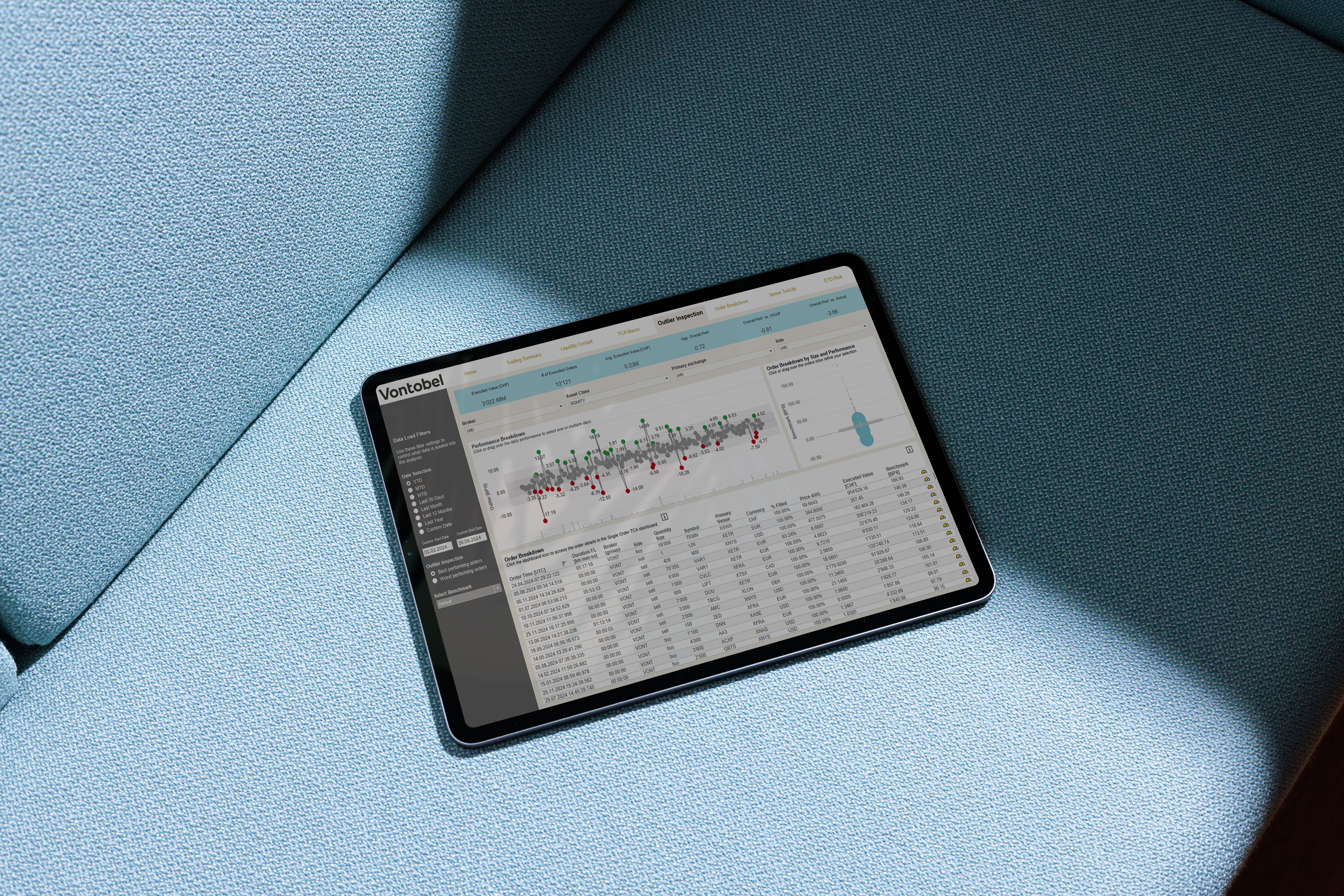
How we shape change in institutional banking relationships
Published on 08.09.2025 CEST
After seeing our client base grow from 15 external clients in 2017 to over 150 in 2024, we understand just how important operations are to our success. We envision a future where the sales process in banking is shaped by a blend of traditional personal relationships, operations, data science, and AI.
Relationship management is undergoing a digital transformation
In recent history, transaction banking has undergone a profound transformation due to digitization. As recently as the 1990s, a stock exchange transaction required the involvement of multiple individuals and took several minutes to complete. However, with the advancement of technology, the same transaction can now be executed in less than a millisecond, entirely without human intervention.
Until recently, relationship management has not reaped the benefits of these trends to the same extent. This is understandable given the complexity of the process, which includes initial client discussions, negotiations, onboarding, account openings, and ongoing client service. These aspects can be challenging to streamline and automate.
Indeed, even if it were possible to automate all these processes, it may not be desirable to do so, as personal relationships remain a cornerstone in institutional client relationships. However, we firmly believe in equipping relationship managers (RMs) with the right tools and standardized processes, while also allowing flexibility where necessary. This strategy reduces routine tasks for RMs, freeing up their time to focus on their core strength: engaging with clients and actively collaborating with them to address their challenges.
Automating workflows
So, how can this be accomplished? When automating any process using any form of technology, it is crucial to ensure that after being entered, the data will maintain a high level of integrity throughout its lifecycle, which may span various systems. Only when data integrity — which is rooted in data awareness — is ensured can we start to build scalable processes.
For these processes to truly serve as beneficial tools, they must be seamlessly integrated into daily RM workflows. For example, during the onboarding process, a tool needs to streamline the steps involved in integrating a new client by assisting with processes such as data entry and document collection. Additionally, tools need to be provided that allow for the efficient recording, tracking, and retrieval of client interactions, enabling RMs to access necessary information swiftly. To support this process, we have successfully incorporated AI into RM workflows, as described by Matthias Schiesser in another article for this magazine. Finally, during periodic client reviews, our tools must provide support in compiling all relevant client data and identifying any potential issues. This allows RMs to concentrate on interpreting the data regarding the strategic assessments of the relationship, rather than on carrying out the time-consuming task of data collection.
In every process, it’s essential to incorporate collaboration into our workflows, as in many cases, multiple teams within Vontobel serve the same client. Therefore, tools designed to support RMs must include built-in collaboration features, which fosters knowledge sharing among the experts, consistent with our aim to serve our clients holistically. This enhances our client service and promotes operational efficiency by preventing duplication of work within the organization, freeing up human resources for more complex tasks such as building sustainable relationships with clients.

«A profound understanding is required to discern which data can be utilized to answer specific questions and draw accurate conclusions.»
Filippo Castagnola
Business Manager Financial Institutions
The influence of data science
We are convinced that the future lies in the integration of data science into our processes. That is why we have strategically invested in developing an internal data analytics platform that encompasses a wide range of topics, including comprehensive trading analytics, profitability analysis, and risk monitoring.
In addition to the challenge of maintaining data integrity, a profound understanding is required to discern which data can be utilized to answer specific questions and draw accurate conclusions. If both challenges are navigated successfully, it will be possible to make decisions that are informed by data, thus increasing profitability and efficiency while enhancing client satisfaction. One of the key benefits derived from our data analytics platform is the in-depth understanding it provides us regarding our clients and their needs, which fosters stronger, more personalized long-term relationships.
The ability to identify problems in a client’s trade flow before they do is a key advantage. Our analytics platform enables us to identify anomalies and potential problems, and this quickly results in enhanced client satisfaction because disruptions are minimized. We believe that empowering clients with data is the future. By providing them with access to data and analytics, we can help clients to understand their business better, make data driven decisions, and achieve their financial goals. Our aim is to be recognized as a trusted partner, one whose role goes beyond that of a conventional service provider.
Our digital service offering
The industry has evolved beyond traditional communication methods that once predominated, such as e-mailing and telephoning, to incorporate a variety of digital channels. Our digital service offering is diverse and tailored to meet the needs of our clients.
The Transaction Banking unit is home to several platforms. Our Trading Analytics Platform™ provides insightful trading analytics, while TBNet serves as a comprehensive e-banking solution for institutional clients. TBNet not only provides access to position reporting but also offers functionalities for market orders and payments, should a client require them. For foreign exchange transactions, we provide FXTrade, which ensures exceptionally deep liquidity.
Additionally, we maintain a digital presence through our website, tb.vontobel.com. Here, we showcase our services and the expertise of our Transaction Banking team. To further bolster our sales efforts, we also run targeted LinkedIn campaigns, enabling us to reach the right audience with the right message.
What is needed for innovation to bear fruit?
Although sales remain grounded in human expertise and personal relationships, technology can empower RMs to excel in their roles. To maximize benefits for and deliver optimal value to clients, it is essential to navigate the landscape of technology.
To address this challenge, we launched the Innovation Hub in 2021. Our objective was to inject the dynamic, entrepreneurial spirit of a start-up into our Transaction Banking unit. The Innovation Hub functions as a creative and experimental space by nurturing unconventional thinking within a flexible framework. At the same time, we are acknowledging that enhancements in banking often transpire progressively, rather than through a single, transformative event.
We believe that the key to our success lies in positioning the Innovation Hub within the Sales division of the Transaction Banking unit. This is based on the idea that you cannot effectively modify a system without having a profound comprehension of its mechanics. Consequently, this close association with the business facilitates a deep understanding of its operations and yields valuable insights for enhancement based on authentic client feedback. This ensures efficient budget allocation and maximizes return on investment, thereby enhancing the value of our Transaction Banking unit’s services.
«We believe that empowering clients with data is the future.»
Matthias Schiesser
Head of Distribution Electronic Trading Solutions

This proximity also ensures rapid feedback cycles when developing solutions, particularly in areas such as data analytics. For example, we frequently roll out updates several times a day during the development phase, resulting in swift, optimal outcomes. However, this approach does not work for larger initiatives that require the participation of various IT delivery teams. In such scenarios, rather than generating value directly by constructing solutions, the Innovation Hub instead functions as a communication nexus, ensuring that developments align with business requirements.
Irrespective of the nature of the problem we aim to solve, we adhere to a methodical approach in our business analysis, guided by the principle: “analyze, verify, prove.” After establishing the business objective, we collaborate with our expert teams, who have an in-depth understanding of Vontobel’s technological landscape and are skilled at crafting solutions. Once we confirm that a technical solution indeed aids in achieving a business objective, the Innovation Hub supervises its implementation and spearheads both the business adaptation process and the transition into operation.
Conclusion
Change is the only certainty. The banking sales process is a blend of traditional personal relationships, operations, data science, and AI. By leveraging a diverse array of technologies, banks can amplify their capabilities, optimize pricing, and empower their clients. This sets the stage for a more efficient, profitable, client-focused banking industry. To ignite this transformation, we believe that the change must originate from within.
However, amid all these advancements, we must never overlook the fact that in transaction banking, trust is the most precious commodity. We are committed to communicating in your language and treating you as an equal partner, thereby cultivating a partnership rooted in mutual respect and understanding.
Contact us
Published on 08.09.2025 CEST
ABOUT THE AUTHORS
 Show more articles
Show more articlesFilippo Castagnola
Business Manager Financial Institutions
Filippo Castagnola is the Business Manager for the Electronic Trading Solutions team within the Transaction Banking unit at Vontobel. He is responsible for leading innovation initiatives within Vontobel’s B2B operations, with a focus on Transaction Banking unit.
 Show more articles
Show more articlesMatthias Schiesser
Head of Distribution Electronic Trading Solutions
Matthias Schiesser heads the Electronic Trading Solutions department in the Transaction Banking unit at Vontobel. He is responsible for the distribution of Vontobel’s low-touch trading platform, custodian services, FX products and the Trading Analytics Platform™ (TAP). His three teams—Innovation Hub, Relationships and Salestrading—cover 150 institutional clients in Switzerland and abroad.

